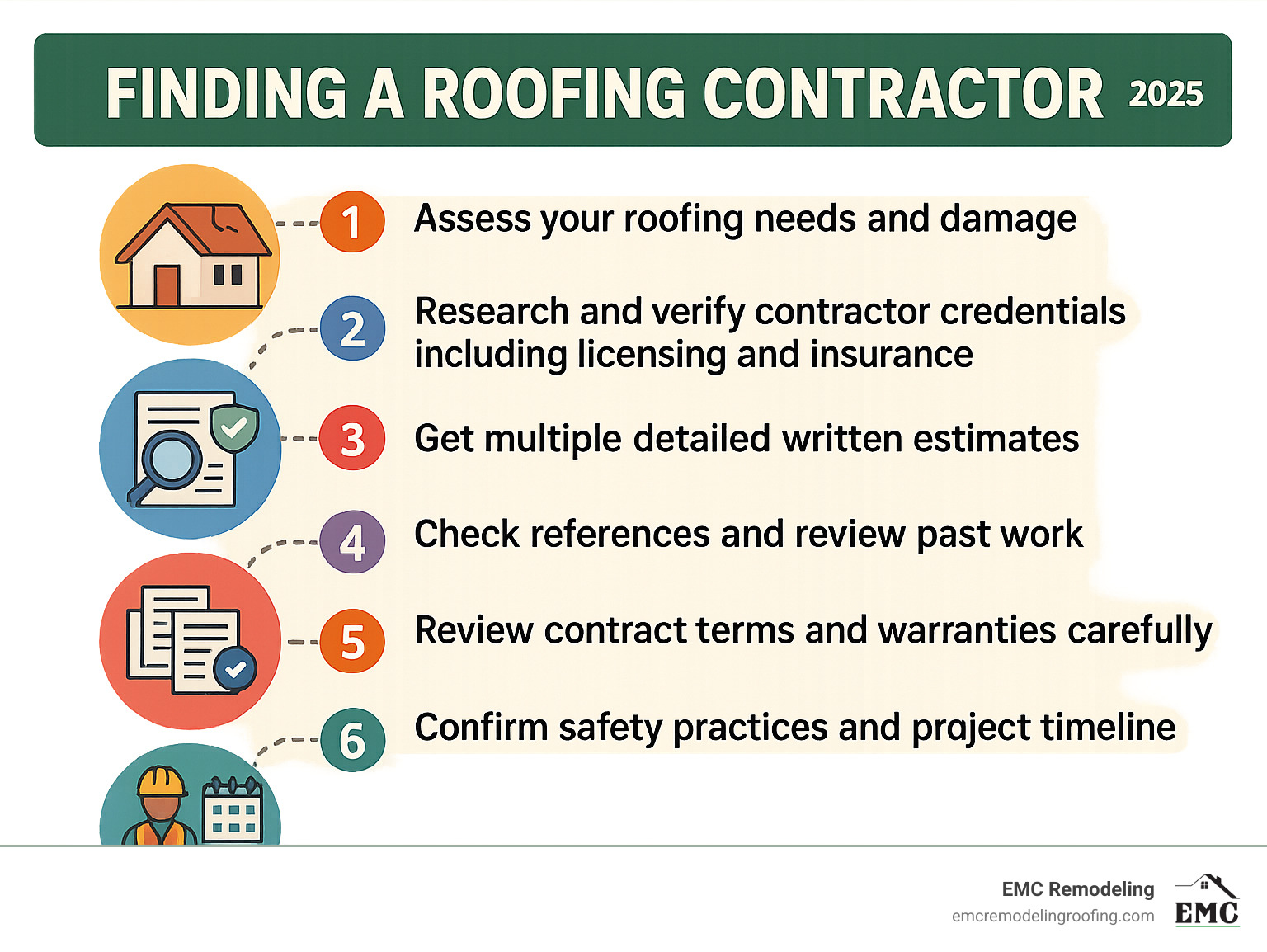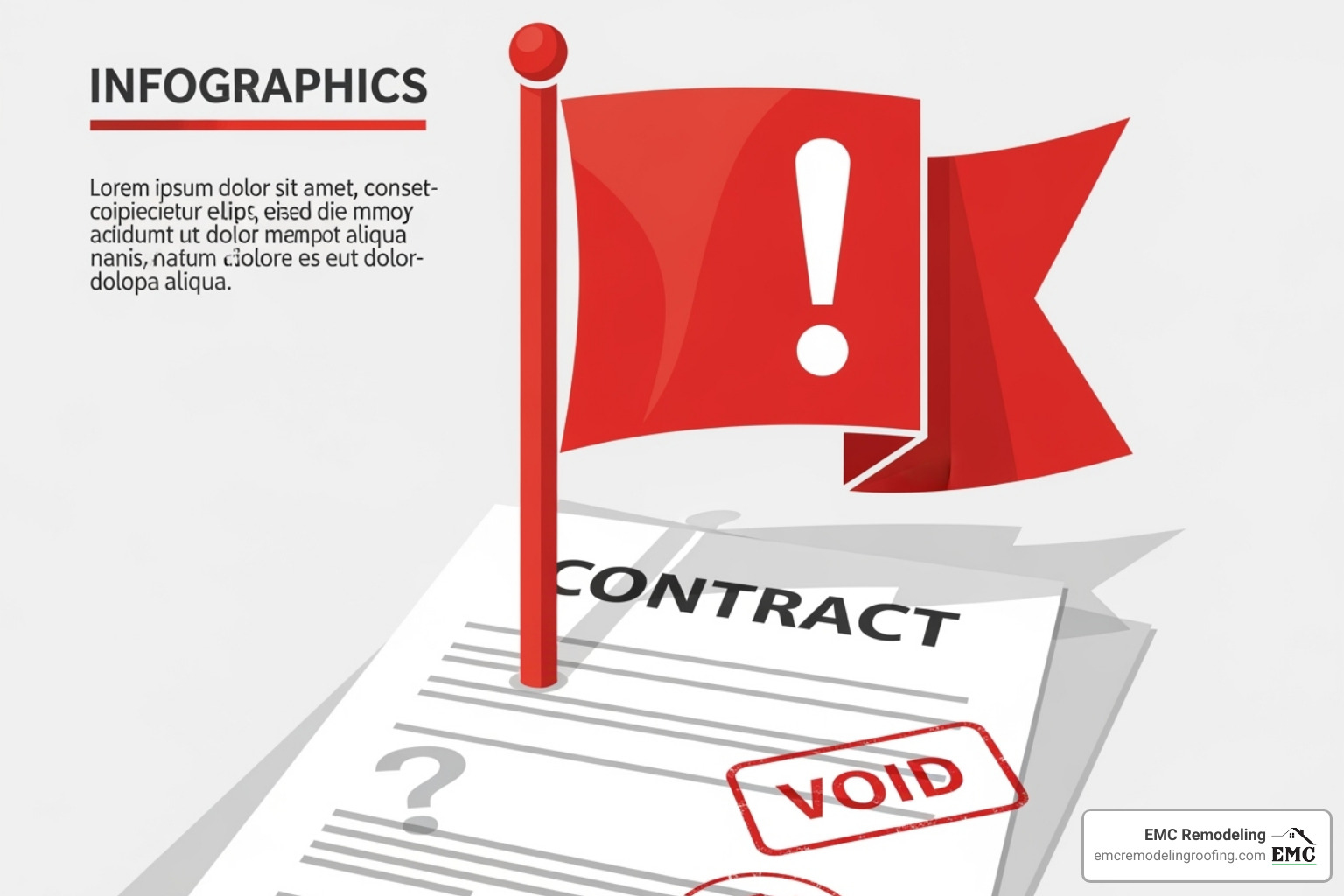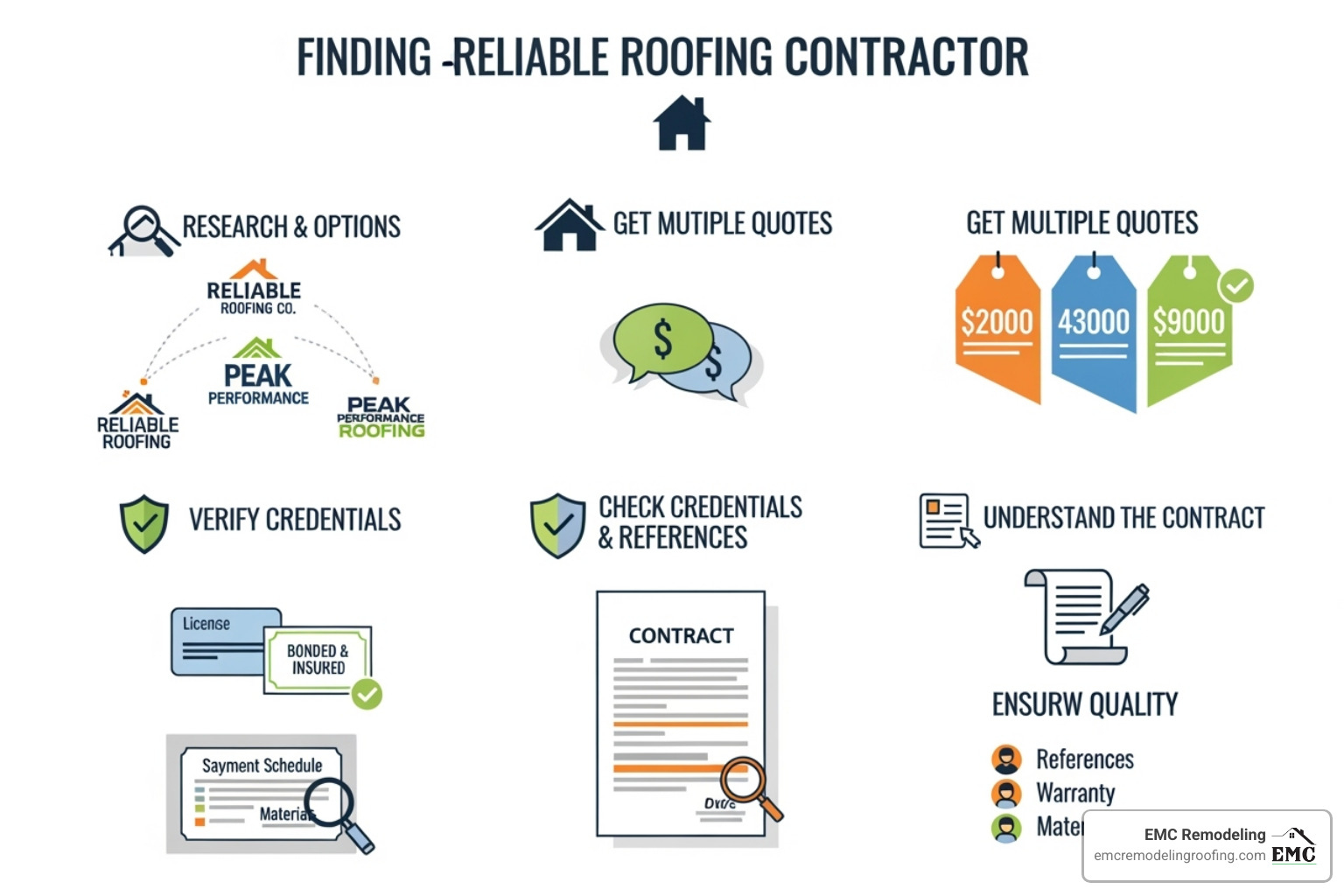Why Finding the Right Roofing Contractor is Critical for Your Home
Finding a roofing contractor can feel overwhelming, but it’s one of the most important decisions you’ll make for your home. Your roof is the first line of defense against Texas weather, and choosing the wrong professional can lead to costly repairs and safety risks. By working with a trusted local roofer, you ensure your contractor understands our region’s unique challenges, from severe storms to specific building codes.
Quick Guide to Finding a Roofing Contractor:
- Verify Credentials – Check licensing, insurance, and certifications.
- Get Multiple Quotes – Obtain at least three detailed written estimates.
- Check References – Ask for recent customer contacts and project examples.
- Avoid Red Flags – Watch for door-to-door sales, cash-only deals, or pressure tactics.
- Review Contracts – Ensure all terms, materials, and warranties are clearly outlined.
- Confirm Safety Practices – Verify OSHA compliance and proper insurance coverage.
The stakes are high. A typical asphalt shingle roof lasts 20-25 years, so this decision impacts your home for decades. Poor installation can void manufacturer warranties, create hazards, and lead to premature failure, forcing a costly replacement.
I’m Matthew Runyon, President of EMC Remodeling & Roofing. With over 15 years in the industry, I’ve seen how poor contractor selection leads to denied insurance claims and structural damage. The right professional relationship protects your investment and your family’s safety.

Basic finding a roofing contractor terms:
Step 1: Assess Your Needs – Repair or Full Replacement?
Before you start finding a roofing contractor, you need to know what your roof needs. Is it a minor repair or a full replacement? A typical asphalt shingle roof lasts 20-25 years, but its actual lifespan depends on installation quality, weather exposure, and maintenance.

Some problems are obvious, like a leak, but others can cause damage for months before being noticed. Knowing what to look for is key.
Signs Your Roof Needs Attention
Your roof constantly battles Texas weather. Here’s what to watch for:
- Curling or buckling shingles: When shingle edges curl up or the middle buckles, it often signals age or poor attic ventilation that’s cooking them from below.
- Missing granules: These sand-like particles in your gutters are your roof’s UV protection. Large amounts of loss mean your shingles are becoming vulnerable.
- Missing or damaged shingles: Obvious gaps, cracks, or broken pieces expose your roof decking to water, turning a small issue into a major problem.
- Spongy or soft feel: If your roof feels soft underfoot (use extreme caution), it’s a serious red flag for water damage to the underlying decking, often requiring a full replacement.
- Leaks in your attic or ceiling: Water stains, drips, or a musty smell mean your roof’s barrier is compromised and needs a professional inspection.
- Age: If your roof is approaching 20-25 years old, it’s wise to have it professionally assessed, even if it looks fine from the ground.
What to Do After a Storm
Central Texas storms can cause significant damage quickly. Here’s an action plan:
- Inspect from the ground: Once it’s safe, walk around your property. Use binoculars to look for missing shingles, dented gutters, or other obvious damage.
- Document everything: Take photos and videos of any damage from multiple angles for your insurance claim.
- Call your insurance company: Report the damage immediately, as most policies have time limits for filing storm-related claims.
- Beware of storm chasers: Be cautious of contractors who appear at your door right after a storm. Many perform low-quality work and disappear, leaving you with future problems.
A thorough assessment of your roof’s condition will better prepare you for finding a roofing contractor who can properly address your specific needs.
Step 2: The Vetting Process for Finding a Roofing Contractor
Once you know your roof’s needs, the detective work begins. Finding a roofing contractor requires digging deeper than flashy websites and sales pitches. You’re choosing a partner to protect your home for the next 20-25 years, so they must be reliable.

Essential Qualifications and Credentials
These credentials separate the professionals from the pretenders and are essential safeguards for your investment:
- Licensing: While Texas doesn’t mandate state licensing, voluntary certification through the Roofing Contractors Association of Texas (RCAT) shows a commitment to high standards.
- Insurance: This is non-negotiable. Verify they have both General Liability (to protect your property) and Worker’s Compensation (to cover their employees) insurance. Ask for current certificates.
- Business Longevity: A company operating for over three years is more likely to be stable and honor its warranties.
- Manufacturer Certifications: Credentials like Owens Corning Platinum Preferred status mean the contractor has received specialized training and can offer improved warranties.
- Professional Memberships: Affiliation with groups like the Better Business Bureau (BBB) demonstrates a commitment to ethical business practices.
The Importance of a Local, Established Presence
A local contractor has a vested interest in maintaining a good reputation within the community. They offer faster response times for emergencies and possess invaluable regional expertise on local building codes, weather patterns, and materials that perform best in the Texas climate.
For homeowners in Central Texas, an established local company is a partner who understands our unique challenges. At EMC Remodeling, we’ve served this area for over 15 years. We’re not just contractors; we’re your neighbors. You can find our physical office right here in Temple:
Name: EMC Remodeling
Address: 5100 Midway Dr Suite 211, Temple, TX 76502
Phone: (254) 760-9268
Having a physical address you can visit provides reassurance that we’ll be here when you need us. Learn more about our commitment to Central Texas families on our About Us page.
Step 3: Comparing Quotes and Understanding the Contract
After identifying qualified contractors, the next step in finding a roofing contractor is comparing estimates. Many homeowners mistakenly choose the lowest bid, but a cheap quote often signals cut corners, poor materials, or inadequate insurance, leading to higher costs later. A roof is a major investment; this is not the time to bargain hunt.
How to Effectively Compare Multiple Estimates
Get at least three written estimates to establish a baseline cost. To ensure an apples-to-apples comparison, look beyond the final price and scrutinize the details:
- Materials: Does the estimate specify the brand, type, and color of shingles and other components?
- Scope of Work: Does the quote include tearing off the old roof, decking inspection, potential repairs, and debris removal?
- Payment Schedule: A reputable contractor will ask for a reasonable deposit, with the bulk of the payment due upon project milestones or completion. Be wary of large upfront payment demands.
- Warranty Information: The estimate should clearly state both the manufacturer’s warranty on materials and the contractor’s workmanship warranty.
What Your Written Contract Must Include
A detailed, written contract is your safety net. A contractor who won’t provide one is a major red flag. A strong contract protects both parties and prevents disputes.
Here’s what separates a weak contract from a strong one:
| Weak Contract Proposal | Strong Contract Proposal |
|---|---|
| “Replace roof – $10,000” | “Complete tear-off of existing asphalt shingles, inspect decking, replace up to 10 sheets of damaged decking (additional sheets at $45/sheet), install GAF Timberline HDZ architectural shingles (color: Charcoal) with GAF Starter Strip, GAF Deck-Armor underlayment, and GAF Cobra Ridge Vent. Install new flashing around chimney and vents. Complete cleanup includes magnet sweep for nails. Project starts 2024-08-01, estimated completion 2024-08-05.” |
| “Payment due upon completion” | “25% deposit upon contract signing. 50% upon material delivery. 25% upon final inspection and homeowner satisfaction.” |
| No mention of insurance | “Contractor maintains General Liability Insurance (Policy #XYZ123) and Workers’ Compensation Insurance (Policy #ABC456). Current certificates of insurance provided upon request.” |
| “Homeowner handles permits” | “Contractor responsible for obtaining and posting all necessary building permits. Permit costs included in total price.” |
| “Standard warranty applies” | “Materials Warranty: GAF Golden Pledge (50-year material coverage). Contractor Workmanship Warranty: 5 years on all installation work.” |
| No cleanup mention | “Daily debris removal during project. Complete site cleanup upon completion, including magnet sweep for nails and metal debris.” |
| “Cash payment preferred” | “Payment accepted via check, credit card, or bank transfer. No cash-only requirements.” |
| Vague timeline | “Projected start: August 1, 2024. Estimated completion: August 5, 2024. Daily communication regarding weather delays or schedule changes.” |
| No lien protection | “Final payment contingent upon receipt of signed lien waiver from contractor and all subcontractors.” |
Your contract must clearly define the scope of work, material list, start/end dates, total cost, and payment terms. It should also include a lien waiver clause to protect you from unpaid supplier bills, detail cleanup procedures, and assign permit responsibility to the contractor.
Step 4: Avoiding Scams and Ensuring a Safe Project
When finding a roofing contractor, vigilance is key. The industry has its share of bad actors, especially after storms. Knowing the red flags and confirming safety protocols are crucial for a successful project.

Common Red Flags and Roofing Scams to Avoid
Watch for these warning signs to avoid storm chasers and contractors who might vanish with your deposit:
- High-Pressure Sales Tactics: A legitimate contractor will give you time to decide, not pressure you with “today-only” deals.
- Large Upfront Payments: Never pay the full amount upfront. Payments should be tied to project milestones.
- Cash-Only Deals: Professionals accept checks, credit cards, or bank transfers. Cash-only deals leave no paper trail and are a major red flag.
- “Free Roof” Offers: A contractor offering to waive or absorb your insurance deductible is committing insurance fraud, which is illegal in Texas per Insurance Code Section 707.
- No Physical Presence: Fly-by-night operations often use unmarked vehicles and have no physical address, making them impossible to find for warranty work.
- Vague Answers: A professional should confidently explain their process and materials. Evasiveness suggests a lack of knowledge.
- Suspiciously Low Bids: An estimate that is dramatically lower than others usually means inferior materials, no insurance, or cut corners.
For more insights, we regularly share valuable information on our Blog.
Permits, Safety, and Warranties
Properly handling legal and safety aspects protects your investment.
- Permits: Your contractor must be responsible for pulling all necessary building permits. If they ask you to do it or suggest skipping them, it’s a sign they may be unlicensed or avoiding inspections.
- Safety: Professional roofers adhere to OSHA safety standards, including fall protection. They should also have a plan to protect your landscaping, siding, and windows during the project.
- Warranties: You need two types of warranties in writing: a manufacturer warranty for material defects and a contractor’s workmanship warranty for installation errors. A reputable contractor stands behind their work with both. Our Roofing Knowledge Center provides more detail on what to expect.
Taking time to avoid these pitfalls will save you money and stress in the long run.
Frequently Asked Questions about Finding a Roofing Contractor
When finding a roofing contractor, homeowners often have the same questions. Here are answers to the most common ones to help you move forward with confidence.
How many estimates should I get for a new roof?
Always get at least three written estimates from different, well-vetted contractors. This is the best way to understand the fair market price for your project and spot any bids that are suspiciously high or low. Comparing detailed proposals also reveals differences in materials, scope, and cleanup procedures that you might otherwise miss.
What is the difference between a workmanship and a manufacturer warranty?
This is a critical distinction. You need both for complete protection.
- A manufacturer warranty covers the roofing materials themselves against premature failure due to defects in production. These can last from 20 to 50 years.
- A workmanship warranty is the contractor’s guarantee on their installation quality. If a leak occurs due to improper installation, this warranty covers the repair. A reputable contractor always provides a clear workmanship warranty.
If a contractor is vague about their workmanship guarantee, consider it a red flag.
Who is responsible for pulling the roofing permit?
The roofing contractor should always pull the permit. Never let a contractor convince you to do it. When the contractor pulls the permit, they take full responsibility for ensuring the project meets all local building codes and passes inspections. A contractor who asks you to handle permits or suggests skipping them is a major red flag and should be avoided.
Conclusion: Make the Right Choice for Your Home’s Protection
Finding a roofing contractor is a significant decision, but it doesn’t have to be overwhelming. By following a clear process—verifying credentials, demanding detailed contracts, understanding warranties, and recognizing red flags—you can confidently choose a partner to protect your home for the next 20-30 years.
A professional installation is an investment in decades of safety and security against the harsh Texas weather. Poor workmanship can void warranties and lead to premature failure, costing you far more in the long run. Your roof is your home’s primary shield; it’s too important to leave to chance.
As a family-operated business in Central Texas, we understand these stakes. We are committed to exceptional craftsmanship, direct owner involvement, and 24/7 emergency support because we’re not just contractors—we’re your neighbors.
If you’re ready to protect your home with a team that values quality and community, explore our residential roofing services. Your home deserves the best protection available.
